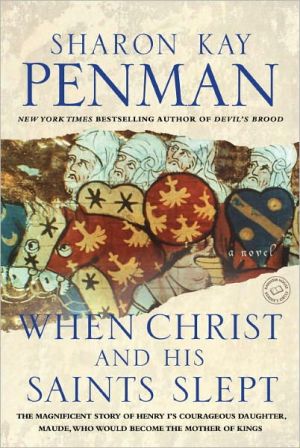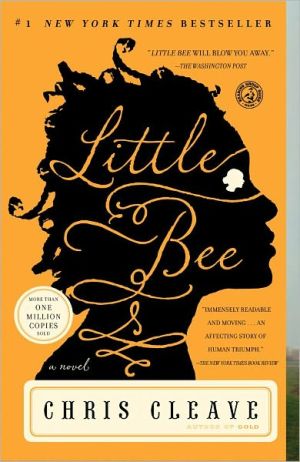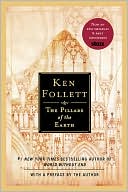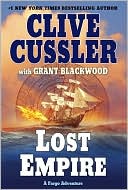When Christ and His Saints Slept (Eleanor of Aquitaine Series #1)
A.D. 1135. As church bells tolled for the death of England's King Henry I, his barons faced the unwelcome prospect of being ruled by a woman: Henry's beautiful daughter Maude, Countess of Anjou. But before Maude could claim her throne, her cousin Stephen seized it. In their long and bitter struggle, all of England bled and burned.\ Sharon Kay Penman's magnificent fifth novel summons to life a spectacular medieval tragedy whose unfolding breaks the heart even as it prepares the way for...
Search in google:
Henry I is dead, and even as the bells toll, his barons confer edgily. Bound by oath, they must now deal with the King's only surviving legitimate issue: the handsome, intelligent, and commanding Maude, Henry's daughter and heir. Just as Maude reaches for the crown, her trusted cousin Stephen moves with treacherous speed to set himself up as king. Bound and determined, Maude sets sail for England—and for war. In this novel, Sharon Kay Penman brings to life a dark period in English history, painting a canvas rich in the color and textures of the era. 746pp.Publishers WeeklyThe magnificent combination of history and humanity that Penman's readers have come to expect again animates her latest work (after Here Be Dragons). Any reservations about it lie more with the period than with her evident abilities as a novelist. Despite the very real tragedy inflicted on the common people by the 12th-century battle between Henry I's surviving legitimate heir, Maude, and her cousin, Stephen of Blois (distaff grandson of William the Conqueror), the era lacks epic qualities. It's somewhat like watching an inept and dirty soccer match with England as the ball: siege follows siege, castles are thrown up, opportunistic barons settle grievances or swipe land as Maude and Stephen fumble for the throne. Still, Penman gives a most persuasive and moving account of these complicated politics. She portrays Maude as a strong woman whose frustrations made her brittle, and Stephen as a man too chivalrous for the age of chivalry. She also introduces her first fictional protagonist in the form of Ranulf, one of Maude's illegitimate half-brothers, a successful addition to the cast until he turns a little soppy and marries a blind Welsh cousin. Perhaps the most impressive feature of the narrative is Penman's skill in showing how essentially good people can end up doing great evil. 75,000 first printing; major ad/promo; author tour. (Apr.)
July 1156 \ Chinon Castle \ Touraine, France \ AS the king of En gland crossed the inner bailey of Chinon Castle, his brother watched from an upper-story window and wished fervently that God would smite him dead. Geoffrey understood perfectly why Cain had slain Abel, the firstborn, the best-beloved. Harry was the firstborn, too. There were just fifteen months between them, fifteen miserable months, but because of them, Harry had gotten it all– En gland and Anjou and Normandy–and Geoffrey had naught but regrets and resentments and three wretched castles, castles he was now about to forfeit.\ He’d rebelled again, and again he’d failed. He was here at Chinon to submit to his brother, but he was not contrite, nor was he cowed. His heart sore, his spirit still rebellious, he began to stalk the chamber, feeling more wronged with every stride. Why should Harry have the whole loaf and he only crumbs? What had Harry ever been denied? Duke of Normandy at seventeen, Count of Anjou upon their father’s sudden death the following year, King of En gland at one and twenty, and, as if that were not more than enough for any mortal man, he was wed to a celebrated beauty, the Duchess of Aquitaine and former Queen of France. \ Had any other woman ever worn the crowns of both En gland and France? History had never interested Geoffrey much, but he doubted it. Eleanor always seemed to be defying the natural boundaries of womanhood, a royal rebel who was too clever by half and as willful as any man. But her vast domains and her seductive smile more than made up for any defects of character, and after her divorce from the French king, Geoffrey had attempted to claim this glittering prize, laying an ambush for her as she journeyed back to Aquitaine. It was not uncommon to abduct an heiress, then force her into marriage, and Geoffrey had been confident of success, sure, too, that he’d be able to tame her wild nature and make her into a proper wife, dutiful and submissive. \ It was not to be. Eleanor had evaded his ambush, reached safety in her own lands, and soon thereafter, shocked all of Christendom by marrying Geoffrey’s brother. Geoffrey had been bitterly disappointed by his failure to capture a queen. But it well nigh drove him crazy to think of her belonging to his brother, sharing her bed and her wealth with Harry–and of her own free will. Where was the justice or fairness in that? \ Geoffrey was more uneasy about facing his brother than he’d ever admit, and he spun around at the sound of the opening door. But it was not Harry. Their younger brother, Will, entered, followed by Thomas Becket, the king’s elegant shadow. \ Geoffrey frowned at the sight of them. As far back as he could remember, Will had been Harry’s lapdog, always taking his side. As for Becket, Geoffrey saw him as an outright enemy, the king’s chancellor and closest confidant. He could expect no support from them, and well he knew it. “I suppose you’re here to gloat, Will, as Harry rubs my nose in it.” \ “No, I’m here to do you a favor–if you’ve the wits to heed me.” The most cursory of glances revealed their kinship; all three brothers had the same high coloring and sturdy, muscular build. Will’s hair was redder and he had far more freckles, but otherwise, he and Geoffrey were mirror images of each other. Even their scowls were the same. “Harry’s nerves are on the raw these days, and he’s in no mood to put up with your blustering. So for your own sake, Geoff, watch your tongue–” \ “Poor Harry, my heart bleeds for his ‘raw nerves,’ in truth, it does! Do you never tire of licking his arse, Little Brother? Or have you acquired a taste for it by now?” \ Color seared Will’s face. “You’re enough to make me believe those tales of babes switched at birth, for how could we ever have come from the same womb?” \ “Let him be, lad.” Thomas Becket was regarding Geoffrey with chill distaste. “‘As a dog returneth to his vomit, so a fool returneth to his folly.’” \ “You stay out of this, priest! But then,” Geoffrey said with a sneer, \ “you are not a priest, are you? You hold the chancellorship, yet you balk at taking your holy vows . . . now why is that?” \ “I serve both my God and my king,” Becket said evenly, “with all my heart. But you, Geoffrey Fitz Empress, serve only Satan, even if you know it not.” \ Geoffrey had no chance to retort, for the door was opening again. A foreigner unfamiliar with En gland would not have taken the man in the doorway for the En glish king, for he scorned the trappings of kingship, the rich silks and gemstones and furred mantles that set men of rank apart from their less fortunate brethren. Henry Fitz Empress preferred comfort to style: simple, unadorned tunics and high cowhide boots and mantles so short that he’d earned himself the nickname “Curtmantle.” Equally indifferent to fashion’s dictates and the opinions of others, Henry dressed to please himself, and usually looked more like the king’s chief huntsman than the king. \ To Geoffrey, who spent huge sums on his clothes, this peculiarity of his brother’s was just further proof of his unfitness to be king. Henry looked even more rumpled than usual today, his short, copper-colored hair tousled and windblown, his eyes slate-dark, hollowed and bloodshot. Mayhap there was something to Will’s blathering about Harry’s “raw nerves” after all, Geoffrey conceded. Not that he cared what was weighing Harry down. A pity it was not an anchor. \ What did trouble Geoffrey, though, was his brother’s silence. The young king was notorious for his scorching temper, but those who knew Henry best knew, too, that these spectacular fits of royal rage were more calculated than most people suspected, deliberately daunting. His anger was far more dangerous when it was iced over, cold and controlled and unforgiving, and Geoffrey was soon squirming under that unblinking, implacable gaze. When he could stand the suspense no longer, he snapped, “What are you waiting for? Let’s get it over with, Harry!” \ “You have no idea what your rebellion has cost me,” Henry said, much too dispassionately, “or you’d be treading with great care.” \ “Need I remind you that you won, Harry? It seems odd indeed for you to bemoan your losses when I’m the one who is yielding up my castles.” \ “You think I care about your accursed castles?” Henry moved forward into the chamber so swiftly that Geoffrey took an instinctive backward step. “Had I not been forced to lay siege to them, I’d have been back in En gland months ago, long ere Eleanor’s lying-in was nigh.” Geoffrey knew Eleanor was pregnant again, for Henry had announced it at their Christmas court. Divorced by the French king for her failure to give him a male heir, Eleanor had then borne Henry two sons in their first three years of marriage. To Geoffrey, her latest pregnancy had been another drop of poison in an already noxious drink, and he could muster up no sympathy now for Henry’s complaint. \ “What of it? You’d not have been allowed in the birthing chamber, for men never are.” \ “No . . . but I’d have been there to bury my son.” \ Geoffrey’s mouth dropped open. “Your son?” \ “He died on Whitsunday,” Henry said, softly and precisely, the measured cadence of his tones utterly at variance with what Geoffrey could read in his eyes. “Eleanor kept vigil by his bedside as the doctors and priests tried to save him. She stayed with him until he died, and then she made the funeral arrangements, accompanied his body to Reading for burial. He was not yet three, Geoff, for his birthday was not till August, the seventeenth, it would have been–” \ “Harry, I . . . I am sorry about your son. But it was not my fault! Blame God if you must, not me!” \ “But I do blame you, Geoff. I blame you for your treachery, your betrayals, your willingness to ally yourself with my enemies . . . again and again. I blame you for my wife’s ordeal, which she need not have faced alone. And I blame you for denying me the chance to be at my son’s deathbed.” \ “What do you want me to say? It was not my fault! You cannot blame me because the boy was sickly–” Geoffrey’s breath caught in his throat as Henry lunged forward. Twisting his fist in the neck of his brother’s tunic, Henry shoved him roughly against the wall. \ “The boy has a name, damn you–William! I suppose you’d forgotten, for blood-kin means nothing to you, does it? Well, you might remember his name better once you have time and solitude to think upon it!” \ Geoffrey blanched. “You . . . you cannot mean to imprison me?” Henry slowly unclenched his fist, stepped back. “There are men waiting outside the door to escort you to a chamber in the tower.” \ “Harry, what are you going to do? Tell me!” \ Henry turned aside without answering, moved to the door, and jerked it open. Geoffrey stiffened, eyes darting in disbelief from the men-at-arms to this stranger in his brother’s skin. Clutching at the shreds of his pride, he stumbled across the chamber, determined not to plead, but betraying himself, nonetheless, by a panicked, involuntary glance of entreaty as the door closed. \ Will untangled himself from the settle, ambled over to the door, and slid the bolt into place. “Harry . . . do you truly mean to imprison him? God knows, he deserves it . . .” He trailed off uncertainly, for his was an open, affable nature, uncomfortable with shadings or ambiguities, and it troubled him that his feelings for his brother could not be clear-cut and uncomplicated. \ Henry crossed to the settle and took the seat Will had vacated. “If I had my way, I’d cast him into Chinon’s deepest dungeon, leave him there till he rotted.”\ “But you will not,” Becket predicted, smiling faintly as he rose to pour them all cups of wine. \ “No,” Henry admitted, accepting his cup with a wry smile of his own. “There would be two prisoners in that dungeon–Geoff and our mother. She says he deserves whatever punishment I choose to mete out, but that is her head talking, not her heart.” After two swallows, he set the cup aside, for he drank as sparingly as he ate; Henry’s hungers of the flesh were not for food or wine. “I’m going to try to scare some sense into Geoff. But since he has less sense than God gave a sheep, I do not have high hopes of success.” \ “Just do not give him his castles back this time,” Will chided, in a tactless reminder of Henry’s earlier, misplaced leniency. “It would serve him right if he had to beg his bread by the roadside.” \ “Sorry, lad, but Scriptures forbid it. Thomas can doubtless cite you chapter and verse,” Henry gibed, “but I am sure it says somewhere that brothers of kings cannot be beggars.” \ “I thought it said that brothers of beggars cannot be kings.” Becket tasted the wine, then grimaced. “Are your servants trying to poison you with this swill, Harry? Someone ought to tell them that hemlock would be quicker and more merciful.” \ “This is why men would rather dine with my lord chancellor than with me,” Henry told Will. “He’d drink blood ere he quaffed En glish wine. Whereas for me, it is enough if it is wet!” Becket’s riposte was cut off by a sudden knock. Henry, the closest to the door, got to his feet; he was never one to stand on ceremony. But his amusement faded when a weary, travel-stained messenger was ushered into the chamber, for the man’s disheveled appearance conveyed a message of its own: that his news was urgent. \ Snatching up the proffered letter, Henry stared at the familiar seal, then looked over at Will. “It is from our mother,” he said, moving toward the nearest lamp. Will and Becket were both on their feet by now, watching intently as he read. “I have to go to Rouen,” he said, “straightaway.” \ Will paled. “Not Mama . . . ?” \ “No, lad, no. She is not ailing. She has written to let me know that Eleanor is in Rouen.”
\ Publishers Weekly - Publisher's Weekly\ The magnificent combination of history and humanity that Penman's readers have come to expect again animates her latest work (after Here Be Dragons). Any reservations about it lie more with the period than with her evident abilities as a novelist. Despite the very real tragedy inflicted on the common people by the 12th-century battle between Henry I's surviving legitimate heir, Maude, and her cousin, Stephen of Blois (distaff grandson of William the Conqueror), the era lacks epic qualities. It's somewhat like watching an inept and dirty soccer match with England as the ball: siege follows siege, castles are thrown up, opportunistic barons settle grievances or swipe land as Maude and Stephen fumble for the throne. Still, Penman gives a most persuasive and moving account of these complicated politics. She portrays Maude as a strong woman whose frustrations made her brittle, and Stephen as a man too chivalrous for the age of chivalry. She also introduces her first fictional protagonist in the form of Ranulf, one of Maude's illegitimate half-brothers, a successful addition to the cast until he turns a little soppy and marries a blind Welsh cousin. Perhaps the most impressive feature of the narrative is Penman's skill in showing how essentially good people can end up doing great evil. 75,000 first printing; major ad/promo; author tour. (Apr.)\ \ \ \ \ Library JournalKing Henry I's death in 1135 led to a bloody 20-year struggle between his only legitimate child, Maude (called Matilda in most historical accounts), and his nephew, Stephen of Blois, for control of England. Penman (The Sunne in Splendour, 1982) showcases her mastery of the historical novel in this long and thoroughly engrossing study of pragmatic politics, idealism, and the role of women during the 12th century. She brings to life a vast array of unforgettable characters, both historical and invented, all of whose loyalties are being constantly tested by the chaos of the times. This novel, the first of a projected trilogy, should win new readers for Penman and delight her longtime fans. It belongs in all public libraries, large and small. [Previewed in Prepub Alert, LJ 12/94.]-Nancy Pearl, Washington Ctr. for the Book, Seattle\ \ \ School Library JournalYA-Maude, the daughter of King Henry I of England, is in contention for the English throne with her cousin Stephen, the son of William I. This is a rousing and detailed account of that 12th-century struggle between them; both held valid claims and had shifting supporters. This 20-year controversy was much like a civil war, with such loss and pain that the period was characterized by a contemporary chronicle as a time of great wretchedness ``when Christ and His Saints slept.'' The events of this period were dramatic and ironic and carry the plot at a hectic pace. The cast of characters is lengthy, but well defined. The fictional principal, Ranulf, is a young nobleman, a squire pledged to Maude's cause. He is introduced as a teenager and both Henry II and Eleanor of Aquitaine are seen in appealing youth. There are battles, sieges, endless treacheries, and excellent views of primitive and advanced politics, all spiced with a great deal of gallantry, camaraderie, suspense, and sex.-Frances Reiher, Fairfax County Public Library, VA\ \ \ \ \ From Barnes & NobleHenry I is dead, and even as the bells toll, his barons confer edgily. Bound by oath, they must now deal with the King's only surviving legitimate issue: the handsome, intelligent, and commanding Maude, Henry's daughter and heir. Just as Maude reaches for the crown, her trusted cousin Stephen moves with treacherous speed to set himself up as king. Bound and determined, Maude sets sail for England--and for war. In this novel, Sharon Kay Penman brings to life a dark period in English history, painting a canvas rich in the color and textures of the era.\ \








